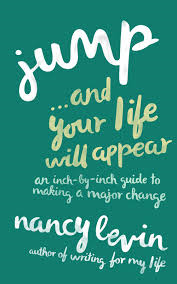In a few short weeks, I will begin working full-time in my private psychotherapy practice. Up to this point, I have always worked for someone else. Thus the idea of being entirely self-employed spurs oodles of terror. My fear-based thinking goes something like this: What if new clients don't appear? How will I pay the bills? I've already changed careers so if this one doesn't work, I'm doomed to failure. Who do you think you are!?
To turn my attention toward the exhilarating aspects of this transition more than the distressing ones, I pick ed up Nancy Levin's Jump and Your Life Will Appear: An Inch-by-Inch Guide to Making a Major Change. I am grateful I did. Her honesty while disclosing her own story combined with the pearls of wisdom shared throughout the book helped me to interrupt the unrelenting self-doubt track playing in my own mind. Levin's book also guided me back to the aspirations that got me here in the first place--to be true to myself and live a wholehearted life. I particularly loved her chapter on honoring our resistance.
ed up Nancy Levin's Jump and Your Life Will Appear: An Inch-by-Inch Guide to Making a Major Change. I am grateful I did. Her honesty while disclosing her own story combined with the pearls of wisdom shared throughout the book helped me to interrupt the unrelenting self-doubt track playing in my own mind. Levin's book also guided me back to the aspirations that got me here in the first place--to be true to myself and live a wholehearted life. I particularly loved her chapter on honoring our resistance.
Levin offered the following criteria for distinguishing resistance from legitimate warnings that we are about to make an ill-advised decision:
If you feel defensive about making a change, if you're making excuses for why you can't make the change, or if you feel defeated before you even begin, you are probably experiencing resistance. If you want the change but feel you can't let go of what you already have, you are probably experiencing resistance. If you're trying to convince yourself that your current life isn't so bad, you're experiencing resistance.
Resistance has certainly been in my house as of late, and I happily heeded Levin's advice to make friends with that resistance--to open to it with curiosity--rather than reject or do battle with it. Of course our impulse is to do anything but let the resistance be there, but I know from experience that the more we resist our experience the more we strengthen it. As Levin wrote, "Resistance is like a beach ball. When you push it underwater, it pops back up to the surface even stronger."
When I've been able to meet the resistance with kindness, I see layers of fear laid bare, many of which were established long before I set out on this latest venture. Sure enough, at the core of my internal bogeymen is an old belief that whatever I do, I'm not good enough and never will be. Thankfully, I know I am more than my thoughts. Each time I identify this pernicious one about my inherent insufficiency, it has a little less power over me and a little more space opens up. It's a gradual process of change, to be sure, but I did not integrate that nasty belief into my being over night. The initial thought of inadequacy had to be repeated over and over and over (and so on and so forth) before it became a belief. I therefore can accept that unlearning it is not going to be like removing tear-away pants and start to shed this habit of diminishing myself, layer by layer.
I can also remember that this voice of self-doubt initially arose in a misguided attempt to keep me safe. By telling myself I needed to and could do more than I was already doing in all areas of my life, I was trying to safeguard my vulnerability from external criticism and judgment. When I can actually absorb that this deficit-based belief emerged to protect me, I easily soften and open to my experience, even when that experience is something as dissatisfying as resistance.
What is more, during the times when the resistance will not pipe down, even after I've attended to and befriended it to the best of my ability, I can remind myself, as Levin reminded me, that I don't have to surrender to its demands. As Levin said about her own process of working with resistance, "I [came to] recognize that the sensations of fight or flight were just the past knocking, and I didn't have to answer that knock."
I appreciated that the chapter on resistance closed with a little text box about offering self-forgiveness. If we take our wholeness to be a birthright, pardoning ourselves for contributing to our fragmentation via our tireless minds makes a lot of sense. So I leave you with Levin's wise instruction on forgiving ourselves for resisting what is good for us:
Forgive yourself for staying in a situation that doesn't serve you. Forgive yourself for resisting your birthright to pleasure, joy, and love, and commit to opening your heart and your life to that birthright. You have a whole new future ahead of you!
